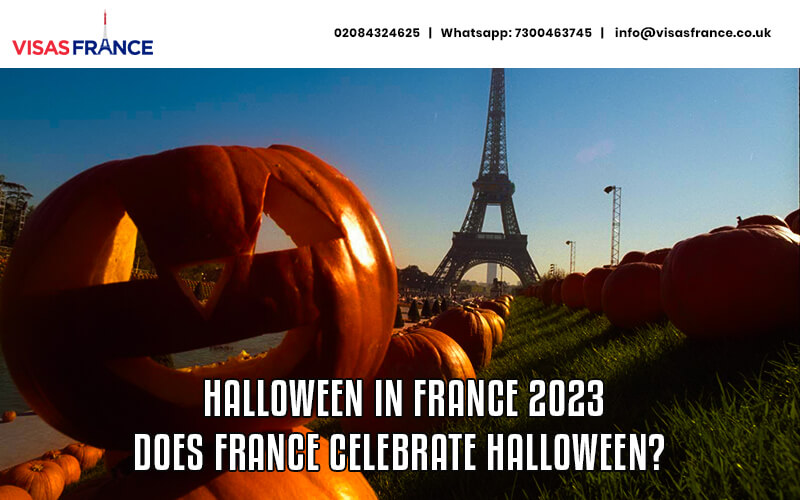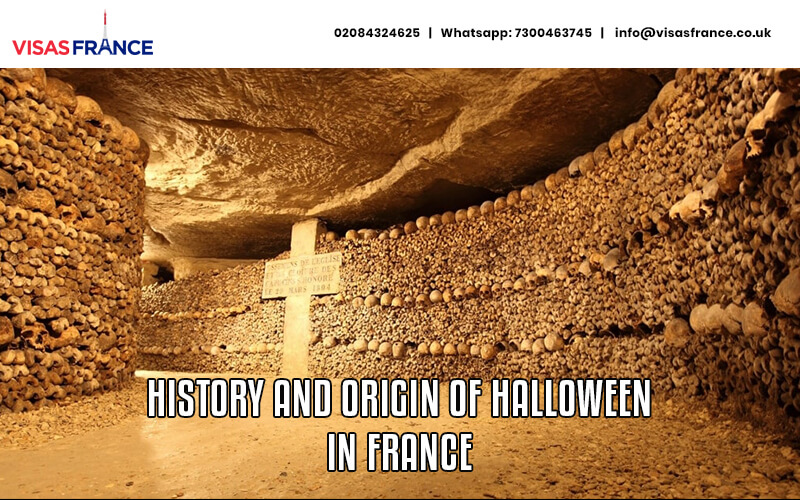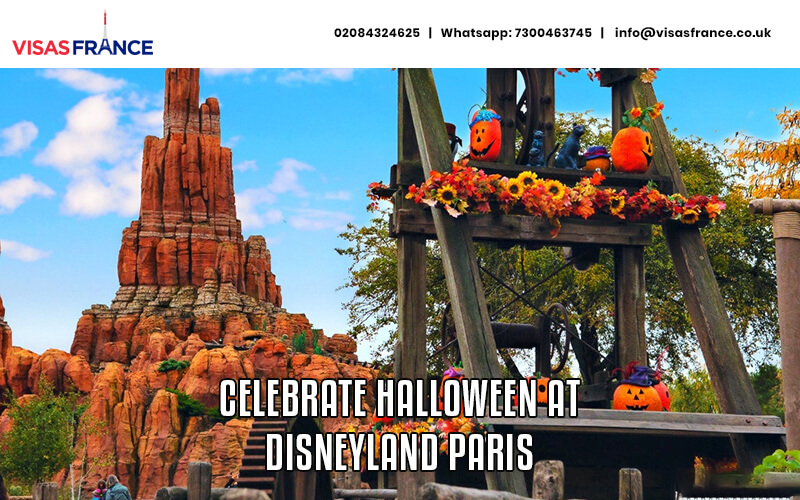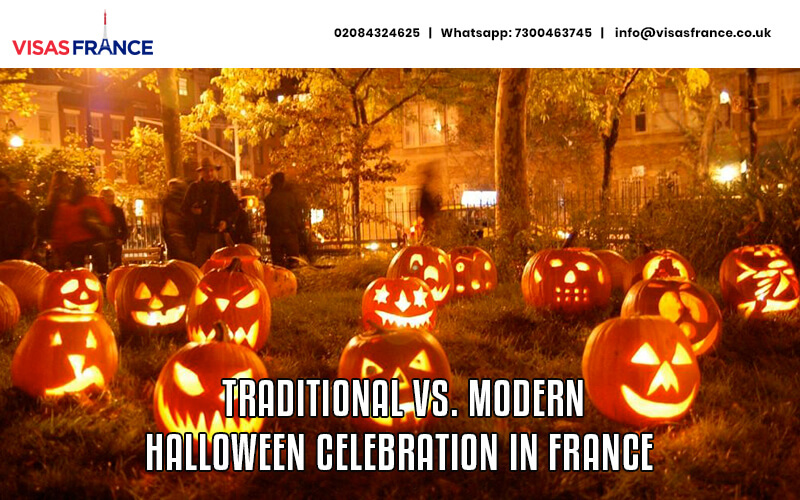
Halloween in France 2023- Does France celebrate Halloween?
October 25, 2023Ghosts and ghouls, witches and werewolves, and lots of candy, Halloween in France is a fun and exciting holiday that gives people of all ages the opportunity to bring their inner child. It’s generally associated with the US, as it is widely celebrated there, but many other countries follow the traditions of this freaky holiday, too. However, the extent to which Halloween is celebrated and the customs associated with it can vary significantly.
France, often known for its rich cultural heritage, is no exception to this global Halloween phenomenon. In this blog post, we’ll explore how France celebrates Halloween, taking a closer look at its unique blend of tradition and modernity. Apply for a France Visa from the UK to celebrate Halloween in France.
Does France celebrate Halloween?
Halloween isn’t customarily a French occasion, but it has gained some popularity among more youthful eras and in larger cities. While it’s not as widely celebrated as in some other countries like the United States, you can find Halloween decorations, costumes, and parties in certain areas of France, particularly in urban areas and areas with a significant expatriate population.
In a few French cities, like Paris, you might see Halloween-themed occasions and enhancements in shops and eateries. Moreover, a few beguilement parks and traveller attractions in France may have Halloween-themed occasions amid the season to cater to both sightseers and local people.
It’s worth noticing that whereas Halloween has picked up footing, conventional French occasions like All Saints’ Day on November 1 and All Souls’ Day on November 2 are still more broadly watched for honouring the deceased.
Overall, whereas Halloween isn’t profoundly established in French culture, you’ll discover a few Halloween-related exercises and celebrations in France, especially in bigger cities and visitor areas.
History and Origin of Halloween in France
Halloween, as we know it today, did not originate in France. It has its roots in the Celtic festival of Samhain, which was celebrated in Ireland, Scotland, and other parts of the Celtic world over 2,000 years ago. Samhain marked the end of the harvest season and the beginning of winter, and it was believed that during this time, the boundary between the living and the dead was blurred, allowing spirits to roam the earth. People would light bonfires and wear costumes to ward off these wandering spirits.

The Christian holiday of All Saints’ Day, or “All Hallows’ Day,” was established in the 8th century by the Catholic Church to honour all the saints and martyrs. It was celebrated on November 1, the night before, known as All Hallows’ Eve, and eventually evolved into what we now call Halloween.
Halloween, as it is celebrated in its modern form with costumes, trick-or-treating, and various spooky traditions, developed primarily in the United States in the 19th and 20th centuries through a blend of Celtic, Christian, and other cultural influences.
In France, Halloween as we know it today is largely influenced by American pop culture. It started gaining popularity in the 1990s and early 2000s, particularly in urban areas and among young people. However, Halloween is not a traditional French holiday, and its roots and customs are not deeply embedded in French culture.
While France has adopted some Halloween traditions and celebrations, the holiday’s origins lie in Celtic and Christian traditions outside of the country.
How does France Celebrate Halloween?
Halloween, in spite of the fact that it is not profoundly established in French culture, has been making its stamp for a long time. Whereas it might not compare to the magnificence of American Halloween celebrations, France has begun to grasp this spooky occasion with eagerness among more youthful generations. Let’s take a closer see at how Halloween is celebrated in France.
Costume Parties
One of the most recognizable aspects of Halloween is the opportunity to dress up in creative and spooky costumes. In France, costume parties have become increasingly popular, especially among young adults and children. People dress up as witches, vampires, ghosts, and other classic Halloween characters. It’s a chance to showcase their creativity and enjoy a night of fun with friends.
Trick-or-Treating
Trick-or-treating, another beloved Halloween tradition, is gaining traction in France, especially in neighborhoods with a strong expatriate presence. Children go door to door, dressed in costumes, and say “des bonbons ou un sort” to receive treats. Some households now have decorations and pumpkins outside to signal their participation in this activity.
Halloween Decorations
Though not as elaborate as in some other countries, you can spot Halloween decorations in stores and occasionally on the streets of France. Retailers stock up on Halloween-themed items like pumpkins, skeletons, and cobwebs. Some cafes and restaurants may also decorate their premises for the season.
Halloween-themed Events
Several cities in France, particularly larger ones like Paris, host Halloween-themed events and parties. These events cater to both locals and tourists looking to immerse themselves in the Halloween spirit. You might find haunted houses, costume contests, and spooky movie screenings during the season.
All Saints’ Day and Halloween
Halloween falls very close to another important French holiday, All Saints’ Day, which is observed on November 1. All Saints’ Day is a time for people to visit cemeteries and honour their deceased loved ones. While Halloween is a fun and spooky celebration, All Saints’ Day is a more solemn occasion focused on remembrance.
Halloween in France- a Good Commercial Opportunity
Halloween is not a typical French holiday, but stores try to take advantage of it, and it’s not unusual to find a “crave your Halloween pumpkin display at grocery store.
Celebrate Halloween at Disneyland Paris

Every October in Disneyland Paris, Halloween celebrations turn Main Street America into Spooky Street; Halloween festivities turn Main Street America into Spooky Street, with a festive parade and special showing of Disney villains. You can also enjoy all the rides, ghosts and party spirit overnight during the Disney Halloween Party on October 31.
While Disneyland Paris may be more expensive than the other destinations on this list, it’s the closest thing France has to a true American-style Halloween party.
Places to Visit on Halloween in France
Visiting France during Halloween can be a delightful and slightly scary experience, mixing traditional French culture with Halloween horror nights. Although Halloween day is not as widely celebrated as in some other countries.
Book your Spain visa appointment today and start planning your dream trip!
Here are some places to consider for Halloween in France in 2023:
- Paris: The capital city is the epicentre of Halloween celebrations in France. You can find a variety of Halloween-themed events, parties, and activities for Halloween in Paris, France. Places like Disneyland Paris often host special Halloween events with decorations, parades, and character meet-ups.
- Strasbourg: Strasbourg is known for its picturesque old town and beautiful architecture. During Halloween, it comes alive with spooky decorations and events. The Strasbourg Halloween Market is a must-visit, with stalls selling Halloween-themed goods, candies, and more.
- Alsace Region: Beyond Strasbourg, the entire Alsace region, with its charming villages, embraces Halloween. Many towns decorate their streets and shops, and you might even find haunted house attractions and pumpkin festivals.
- Puy du Fou: This historical theme park in western France often hosts special Halloween-themed events. It’s known for its immersive historical shows, and during Halloween, they incorporate spooky elements into the performances.
- Châteaux of the Loire Valley: The Loire Valley is famous for its stunning châteaux, and some of them offer special Halloween-themed tours or events. Exploring these beautiful and historic sites with a spooky twist can be a unique experience.
- Provence: In the southern region of Provence, you can find Halloween-themed activities and events, in cities like Marseille and Avignon. Some vineyards even host Halloween wine tastings.
- Cemeteries: While it might seem unconventional, visiting historic cemeteries can be particularly atmospheric during Halloween. The Montparnasse Cemetery in Paris is the final resting place of many famous individuals and is especially eerie at night.
Traditional vs. Modern Halloween Celebration in France
To understand the place of Halloween in France, it is important to consider the historical context of the country. Halloween is a relatively new import to France compared to countries where the holiday has deep-rooted historical ties. France’s history has influenced its particular approach to celebrating Halloween.

- Trick-or-Treating: Trick-or-Treating, a major Halloween activity, has gone to France, mostly in urban and suburban areas. Children dress up in costumes and go door to door, saying “des bonbons ou un sort” , similar to “trick-or-treat”.
- Pumpkin Carving: Carving jack-o’-lantern pumpkins is a North American tradition. In France, you can find pumpkins and shops that sell pumpkins for carving. This activity has become increasingly popular with families and young people.
- Halloween decorations: French merchants benefited from the commercial aspect of Halloween by selling decorations, costumes and themed products. As Halloween approaches, shops display a range of spooky decorations such as spider webs, skeletons and witches’ hats.
Modern French Halloween Celebrations
A blend of American-style festivities and French cultural influences characterizes the modern celebration of Halloween in France. While the holiday’s roots are not as deeply embedded in French history as it has evolved into a unique fusion of tradition and modernity.
- Costume parties: Halloween costume parties have gained popularity in France, especially among young adults and students. These parties often feature creative and elaborate costumes offer people a chance to embrace the playful and imaginative spirit.
- Themed events: Restaurants, bars and clubs in major French cities often host Halloween-themed events and parties. These gatherings include costume contests, special Halloween menus and spooky decorations that create a lively atmosphere for revellers.
- Haunted houses and attractions: Halloween attractions such as haunted houses, mazes and horror-themed escape rooms have sprung up in France. These attractions are for those looking for a more intense and immersive Halloween experience.
- Halloween foods and sweets: Bakeries and bakeries in France often offer Halloween-themed sweets, such as pumpkin-shaped pastries and cookies. Additionally, restaurants can present seasonal dishes that include ingredients such as pumpkin and chestnuts with great pumpkin carving ideas.
Halloween in France has become an exciting celebration in France, especially in urban areas and among the younger population. Whether you’re a local or a visitor, experiencing Halloween in France can be a delightful and terrifying adventure that offers a unique blend of tradition and celebration.
So, what are you waiting for? Book your France visa appointment today and avail online France Visa to take part in the exciting festivities of Halloween in France. Happy Halloween!
Read more Blogs:
- France vs Italy: Make the Right Travel Choice in 2023
- How to Travel from The UK To France Without Flying?
- Top France Festival Lineup 2023 – Apply France Visa Now!
FAQ’s
Does Halloween’s date change year after year?
No, Halloween is always on October 31, but the weekdays change.
How early should I apply formy France visato celebrate Halloween?
You should apply for a France visa as early as possible from the intended travel date but no earlier than three months.
How long does it take to process a French visa application?
The processing time for a France visa application can vary. It typically takes around 15 calendar days for a decision to be made, but it may take longer during peak seasons. Applying well before your intended travel dates is advisable to allow sufficient processing time.
What documents do I need for a France visa application?
The specific documents required may vary based on the type of visa you are applying for. However, common documents include a valid passport, completed visa application form, proof of travel insurance, proof of accommodation, financial statements, and supporting documents based on your visa category.
How should I apply for a France Visa from London?
To apply for a France Schengen Visa in London, you need to follow the four-step process. These include:
· Fill up the onlineFrance visa application form
· The team will book your France visa appointment at the visa centre
· Visit the Visa Centre with all the required documents
· Get your France Tourist visa in the UK

Recent Post
Know more about France before your holiday visit
January 25, 2018If you have chosen France for spending your holidays then you have made a wise choice but before you proceed for a visit to this country, do you know enough about it?...
Read MoreEgg Hunts with a French Twist: Unique Easter Traditions Across France
February 20, 2024Looking to add some French joie de vivre to your Easter celebrations this year? Join us as we crack open delightful Easter traditions across France, from colorful chocolates to egg...
Read MoreBest 7-day itinerary for Paris and the South of France
September 17, 2024France is one of the most visited places in the world. This place has one of the most beautiful towers, the Eiffel Tower which is considered the most romantic place...
Read More
 7300463745
7300463745 info@visasfrance.co.uk
info@visasfrance.co.uk





